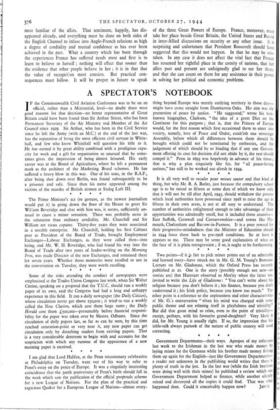Two points—if it is fair to pick minor points out
of an admirable and learned essay—have struck me in Mr. G. M. Young's Romanes Lecture on Mr. Gladstone, which the Oxford Press has recently published at 2s. One is the story (possibly enough not new—no stories are) that Harcourt observed to Morley when the latter was invited to write the Life of Gladstone: "You can't write about his religion because you don't believe it ; his finance, because you don't understand it ; his Irish policy, because you know too much." The other point is a reference to the copiousness and other characteristics of Mr. G.'s conversation "when his mind was charged with some public theme and not relaxing itself in playfulness and triviality." But did that great mind so relax, even to the point of triviality— except, perhaps, with his favourite grand-daughter? Very likely it did, for Mr. Young is usually right. If so, the impression that his table-talk always partook of the nature of public oratory will need
correcting. * * * *


























 Previous page
Previous page